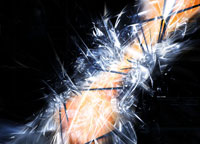Supercell Produces Oil and Cures Cancer
Certain bacteria are capable of solving problems people cannot solve. They can consume radiation, produce electricity and oil and even treat cancer. American scientists from a California University decided to create a “supercell” that will do all this simultaneously. Pravda.ru talked to Vitaly Kulikov, a Professor of Biological Science, to find out whether this genetic modification is justified.

Bacteria are successfully utilized in many areas of human activity. They can solve problems people can't solve. For example, Geobacter sulfurreducens can consume radiation. Uranium derivatives and other radioactive materials are one of the components of its diet.
American scientists discovered that this bacterium can feed on scraps of radioactive solids and is absolutely inert to other environmental substances. Besides, it is safe for human beings. It explains numerous projects using this bacterium for thorough cleaning of nuclear stations waste waters used to cool reactors.
Other bacteria are capable of producing electricity. Various bacteria use regular natural materials – natural gas, methane, and cellulose.
The energy they produce is sufficient to light a residential building or power up a car. Although biologists have not yet found an efficient way to control this process, the future of bacterial power is highly rated. Experts are convinced that in the future this energy will satisfy a significant part of human needs.
Bacteria can create oil products. They don’t need millions of years to produce it either. In the US a team of a geneticist and biologist from a small private firm created a modification of E.Coli that is capable of creating complex hydrocarbon chains.
Of course this is not pure oil, but such chains can be used to produce substances that are normally produced in the process of oil refining. The developers assure that their microscopic oil plant is completely eco-friendly and is ready for implementation.
German scientists “taught” organic cells to successfully fight cancer cells. When injected into a human body, these tiny saviors rush to help cells suffering from cancer and defeat the enemy with “therapeutic genes.” They stop tumor growth and in some cases, fully treat injured areas.
There are dozens of areas where various bacteria and organic cells can be applied (and are applied). Humanity is learning to manipulate microscopic creatures and adjust them for their needs.
Several American scientists of a California University got excited about an idea to combine the capabilities of microorganisms in one supercell. Looking at stem cells used for various purposes, including regeneration of a human body, biologists decided to create a universal bacterium that could turn on and off various functions depending on its environment.
Despite the fact that the project is still at the stage of discussion, it has plenty of proponents and opponents. The supporters are convinced that this supercell will allow unification of bacteria growth for industrial and domestic needs.
The opponents insist that genetic modification is a complex procedure and that there is a possibility of numerous side effects. They believe that utilization of different bacteria for different needs is sufficient.
Pravda.ru decided to find out what Russian biologists think about this issue and consulted with Vitaly Kulikov, a Professor of Biological Science, a member of the Institute of General and Experimental Biology.
“Bacteria evolve along with the environment. They develop new capabilities and lose the old ones. However, the world progresses, and the existing functions of microorganisms are not sufficient,” says Kulikov.
Microbiologists and geneticists interfere with nature more and more, and modify bacteria and cells for specific purposes. In most cases, such interference is justified and useful. However, it is impossible to predict all consequences of such manipulations.
Scientists trying to modify the nature take upon a great responsibility. I think that attempts to re-create microorganisms should be made only if necessary. We don’t know all the mysteries of nature; therefore, we can’t think we are gods.”
Pavel Urushev
Pravda.Ru
Subscribe to Pravda.Ru Telegram channel, Facebook, RSS!


